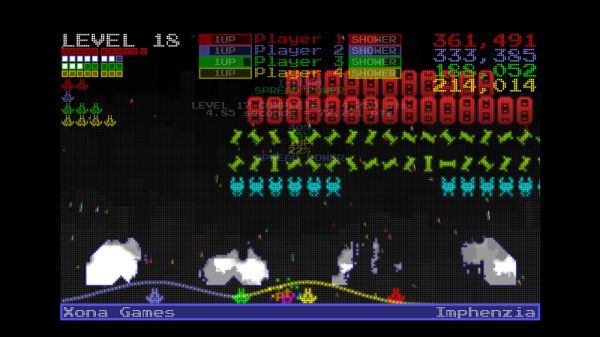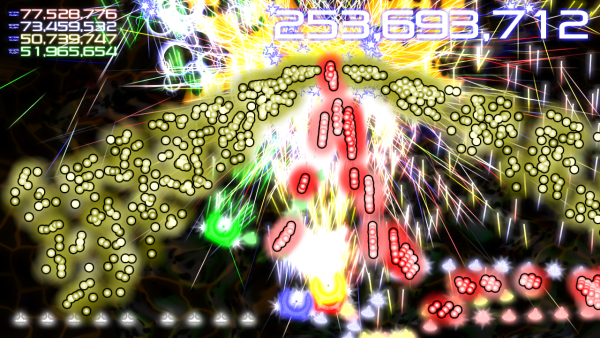
A screen from Decimation X3, an improved version of their original Decimation X XBLIG release
Co-Optimus: Have there been any particular challenges you’ve noticed in developing co-op games?
Matthew: Co-op games require more beta-testing, and beta-testing doesn’t come easy. We’ve all played games and asked if the development team even bothered to beta-test it. Obviously the answer is yes, but beta-testing is a deep commitment, too deep to ask friends and relatives to complete and too expensive for indie studios to hire out.
Co-Optimus: When implementing co-op play, were there certain features you considered trying out, like co-op based attacks? Or did you want to just keep things straightforward and simple?
Matthew: We thought of all of these things. We have been told so many times that Duality ZF, our upcoming 4-player shmup, should have ships that merge together. Aegis Wing and other shmups allow merging of multiple players’ fighters, but in the end it’s kind of lame. So, instead of doing something that only sounds cool, we do things that are cool in implementation and stay away from marketing gimmicks. An example feature in Duality ZF that works is the ability for each player to control two fighters at once, something we coined as “dual play”. Dual play is an underground concept created in Japanese arcades, where a master player would put quarters into both slots and control player 1 and player 2 at the same time, usually with buttons taped down. Point is, they wouldn’t do it if it didn’t work. So it works. So we use it.
So to answer your question directly, we do keep things simple only because it works. We really concentrate on what works first and try to make it simple after. Most innovative game concepts are complicated, which lowers their general reception. It often makes for a hard circle to square. I still have complete respect for Ikaruga’s polarity feature, as well as the integration of it across three difficulty modes in different fashions. It’s awesome, simple, works, and I wish I came up with it.

Screen from Score Rush, the first widescreen bullet hell 'shmup; there are 4 players somewhere in there, we swear
Co-Optimus: The games you’ve produced thus far have gone from Space Invaders, with various improvements and tweaks along the way, to the twin-stick shooter. Why shooters/this particular genre?
Matthew: Decimation X, the Space Invaders game, is actually based off TI-Invaders, which we both think is the best Space Invaders clone ever made, better than the original. Jason coded [Decimation X] in a day, from scratch, during a boring day at work in a summer job. (Why we didn’t just stay home and make games still frustrates me. Tip from Xona Games: Follow your heart!) When we ended up in the top 3 in a $100,000 start-up technology contest, and realizing our competition hadn’t gone to market yet, we knew we would win if we could showcase our ability to get to market. So over the next 3.5 weeks, Jason coded Decimation X precisely for this purpose, because it was a fast game to make. On some level we are upset with its quality, which is lower than anything we will ever produce again, but when it became #1 in Japan in ratings during the 2-week judging section winning us the contest, it helped us accept it.
Decimation X was released for business reasons not hobbyist reasons. There’s the distinction between hobbyist and business that you will run into over and over again while starting up your own game studio. These are the toughest decisions to make… And as you grow as a company you start to realize complaints from gamers and press can all too often be unrealistic in their expectations. You have to survive, to continue to make games, while trying to sell out the least possible. One example company comes to mind: Treasure. Think of the games they are most respected for (Ikaruga, Radiant Silvergun, Gunstar Heroes) and look up the games that have made them the most money. You’ll be surprised.
Next Score Rush, which is the worlds’ first widescreen bullet hell shmup. It was an experimentation of Duality ZF concepts, and uses the Duality ZF engine as well as early Duality ZF enemy prototypes. (We actual detail some of the lessons learned from this experiment here.) The problem with bullet hell games going widescreen is you move too slow to cover the screen. The solution? Multidirection shooting. It was born out of necessity. Plus it made Score Rush the worlds’ first bullet hell dual-stick shmup!
So, there it is. Both came from necessity. Our real goal is found in Duality ZF, a 2D shooter that we’ve always wish was made for us to play but never was.